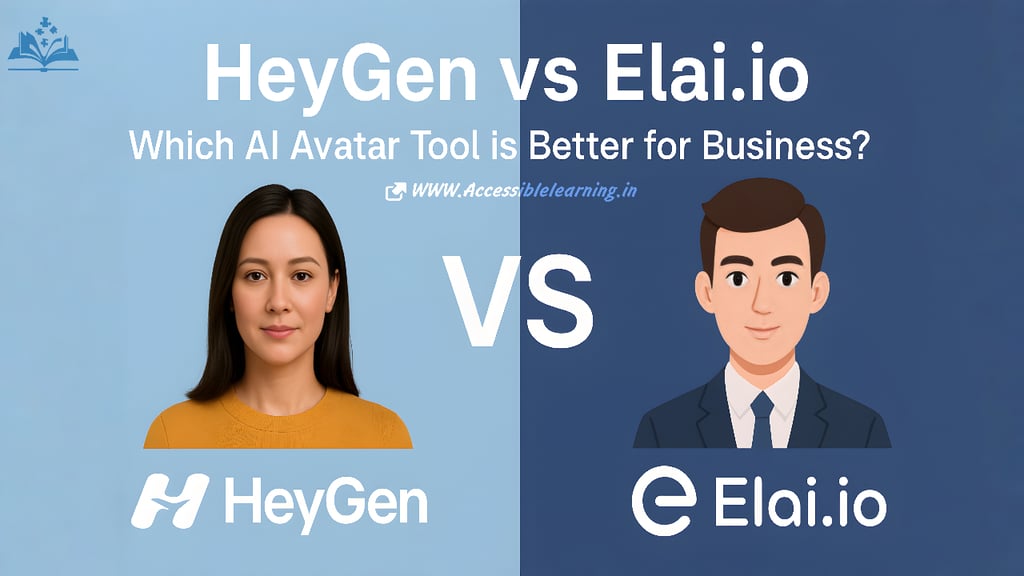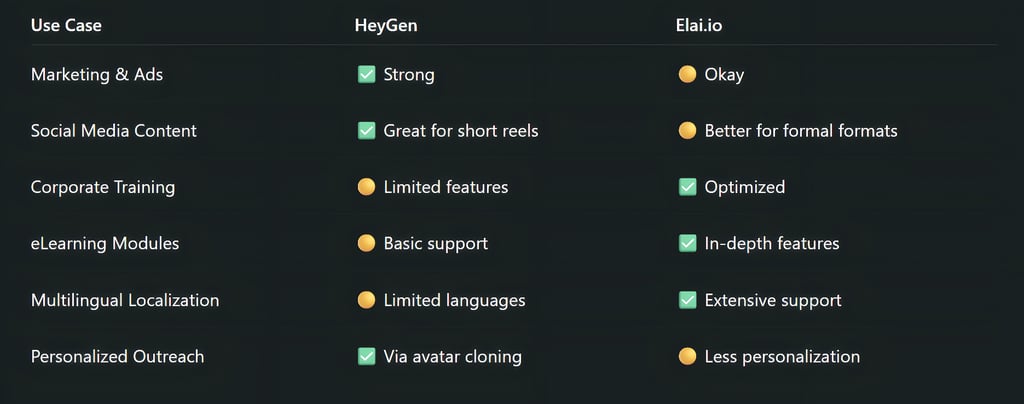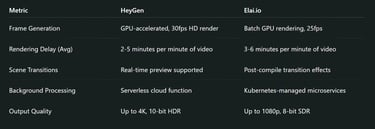
HeyGen vs Elai.io: Which AI Avatar Tool is Better for Business in 2025?
Compare HeyGen and Elai.io in this deep-dive analysis of AI avatar tools. Discover which platform delivers better value, realism, and scalability for modern businesses.
AI ART TOOLSARTIST/CREATIVITYAI/FUTURECOMPANY/INDUSTRY
Sachin K Chaurasiya
6/29/20255 min read


In the fast-evolving landscape of business content, video remains king. But not everyone has the time, resources, or talent to appear on camera. This is where AI avatar video generators like HeyGen and Elai.io come into play. These tools let businesses create professional-looking videos featuring photorealistic or animated digital presenters—without ever stepping in front of a camera.
But with both platforms offering compelling features, which one is the better choice for businesses in 2025? Let’s break down HeyGen and Elai.io across critical parameters—technology, user experience, integrations, pricing, and business-specific use cases.
HeyGen (formerly Movio)
HeyGen is known for its hyper-realistic avatars, smooth lip-syncing, and intuitive UI. It emphasizes lifelike video presentations and has gained popularity among marketers, agencies, and content creators.
Core Strengths
Ultra-realistic avatars (based on real humans)
AI voice syncing with emotional tonality
Script-to-video in a few clicks
Multi-scene editor with animated transitions
Personal avatar creation from a selfie or video
User Interface & Workflow
Drag-and-drop scene editor
Script typing + AI assistant
Clean, modern UI for quick edits
Supports image/video uploads, gestures, and motion transitions
Pros
Realistic avatars
Emotional voice delivery
Easy-to-use video editor
Great for social and marketing
Cons
Limited automation
Not ideal for bulk training
Fewer integrations
Elai.io
Elai.io focuses on scalability and B2B efficiency, making it ideal for corporate training, onboarding, and localization. It supports multi-slide presentations, bulk video generation, and seamless multilingual content delivery.
Core Strengths
80+ languages and multiple voices per language
Custom avatars and corporate branding
API access for automation
Script-to-video & PowerPoint-to-video
Training- and e-learning centric
User Interface & Workflow
PowerPoint-like slide editor
Bulk script import via CSV
Advanced multi-language editor
UI less visual and more utility-oriented
Pros
Designed for scale and enterprise
API and CSV import
80+ language voice support
PowerPoint/video input capability
Cons
Less visual appeal
Fewer avatar realism options
Slightly steeper learning curve






AI Model Architecture
HeyGen
Uses diffusion-based face animation models trained on high-res video datasets to synthesize natural facial expressions.
Relies heavily on GAN-based deepfake synthesis techniques with real-time adjustment of lip-sync using viseme alignment.
Supports neural rendering to simulate hair movement and facial microexpressions using temporal coherence optimization.
Elai.io
Employs a modular transformer pipeline, separating text parsing, language modeling, and avatar rendering.
Uses multi-frame interpolation networks (MF-IN) for lip-sync and head movement that are frame-rate adaptive.
Optimized for low GPU memory usage, making it scalable for multi-threaded video rendering in cloud clusters.
Voice Synthesis & Audio Rendering
HeyGen
It integrates third-party TTS providers (like ElevenLabs or Google WaveNet) with its own post-processing layer.
Features contextual intonation matching, where the model adjusts pitch and pauses based on sentence syntax.
It also supports emotive speech synthesis, allowing emotion tags like “joyful,” “angry,” and “empathetic.”
Elai.io
Built on a hybrid of Tacotron 2 and FastSpeech2 models for real-time audio rendering.
The voice engine includes phoneme-level prosody control for uniform pronunciation across accents.
Custom voice training requires ~15 minutes of studio-quality audio and generates voices with <2% phoneme drift.
Data Privacy & Compliance
HeyGen
Data processed under SOC 2 Type II and GDPR compliance.
Videos and avatar data are stored temporarily; custom avatars can be deleted permanently.
Uses end-to-end encryption during rendering jobs.
Elai.io
GDPR and HIPAA-ready (for eLearning/healthcare content).
Option to deploy on-premises for enterprise (via Docker).
API endpoints include OAuth 2.0 authorization and IP whitelisting.
Cloud Infrastructure & Scalability
HeyGen
Hosted on the AWS cloud with edge rendering via CloudFront.
Rendering nodes auto-scale based on user load but have limited concurrency (ideal for SMEs).
No direct GPU control for end users.
Elai.io
Built on GCP with Kubernetes, allowing elastic rendering clusters.
Offers dedicated VMs for enterprises, enabling parallel video generation across departments.
It also supports content versioning and asset locking for collaborative workflows.
Localization & NLP Optimization
HeyGen
Uses shallow NLP parsing for subtitles and auto-speech sync.
Supports limited contextual translation; best with external translation APIs.
No built-in glossary management for terminology consistency.
Elai.io
Leverages BERT and mBART models for semantic parsing.
The localization engine includes domain-adapted language models (medical, corporate, and finance).
Maintains a custom lexicon for each brand to ensure multilingual consistency.


FAQs
What is the primary difference between HeyGen and Elai.io?
HeyGen focuses on ultra-realistic avatars and emotional delivery for marketing and social content. Elai.io is built for scalable, multilingual, and structured video creation, ideal for corporate training and enterprise needs.
Which platform supports better voice customization?
Elai.io allows custom voice cloning and phoneme-level control. HeyGen supports emotional tone selection but relies more on external TTS integrations.
Can I create multilingual videos with both tools?
Yes. Both tools support multilingual capabilities, but Elai.io offers better localization features with support for glossaries, translation memory, and contextual consistency.
Do HeyGen or Elai.io allow API integration?
Yes. Both platforms provide API access, but Elai.io has a more enterprise-focused API with authentication options, webhooks, and scalable architecture.
Which AI avatar tool is more budget-friendly for startups?
HeyGen is typically more affordable for smaller teams and short-form content. Elai.io offers advanced features but may be better suited for larger organizations.
Are the videos created by these platforms royalty-free?
Yes, both HeyGen and Elai.io offer royalty-free usage for videos created on their platforms, including commercial use, subject to their terms.
Can I train my own custom avatar on either platform?
Yes. Both platforms support custom avatar creation. HeyGen allows hyper-realistic video avatar training, while Elai.io supports animated avatars and training with business attire or branding.
Which Tool is Better for Business?
The right tool depends on your business goals.
Choose HeyGen if your focus is customer-facing video content, personalized marketing, or social media storytelling. It’s ideal for startups, creative agencies, and solopreneurs who value human touch and branding aesthetics.
Choose Elai.io if your needs are corporate training, onboarding, educational content, or scalable localization. It’s better suited for enterprises, HR teams, eLearning platforms, and businesses with international outreach.
HeyGen and Elai.io are both excellent AI avatar platforms—but serve different ends of the business spectrum. Whether you’re building a powerful brand voice or training a global team, the right tool can save time, cut costs, and boost engagement.
Subscribe To Our Newsletter
All © Copyright reserved by Accessible-Learning Hub
| Terms & Conditions
Knowledge is power. Learn with Us. 📚


